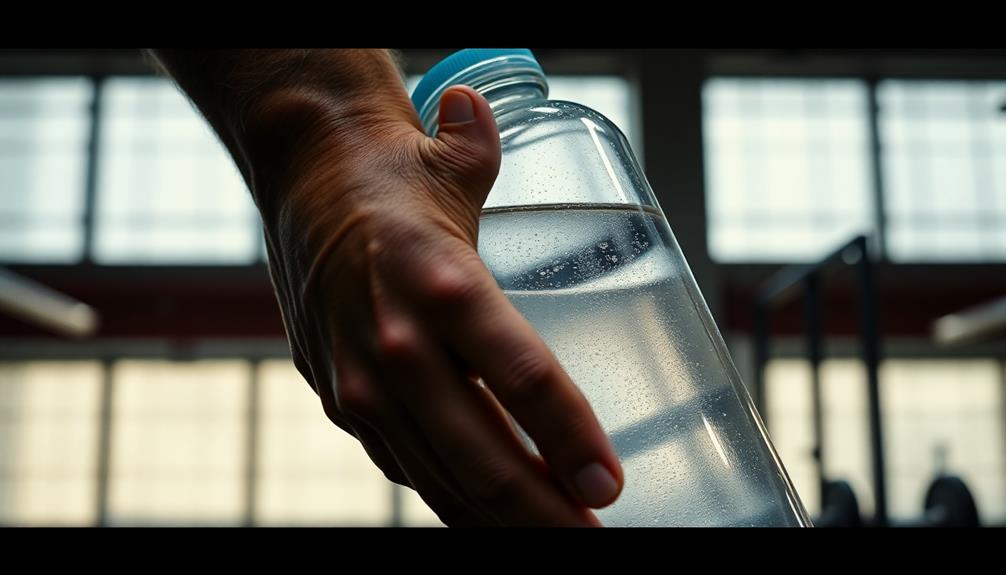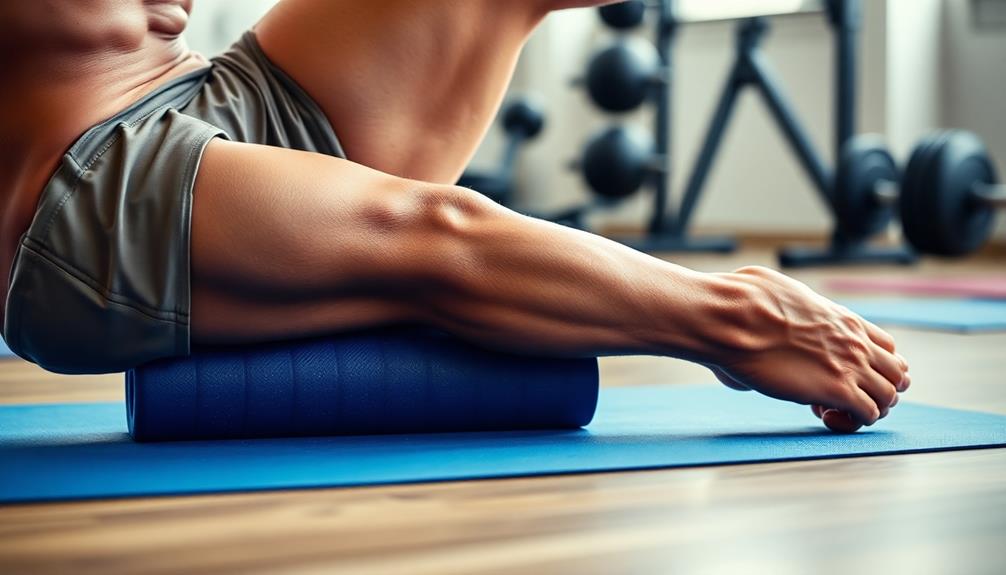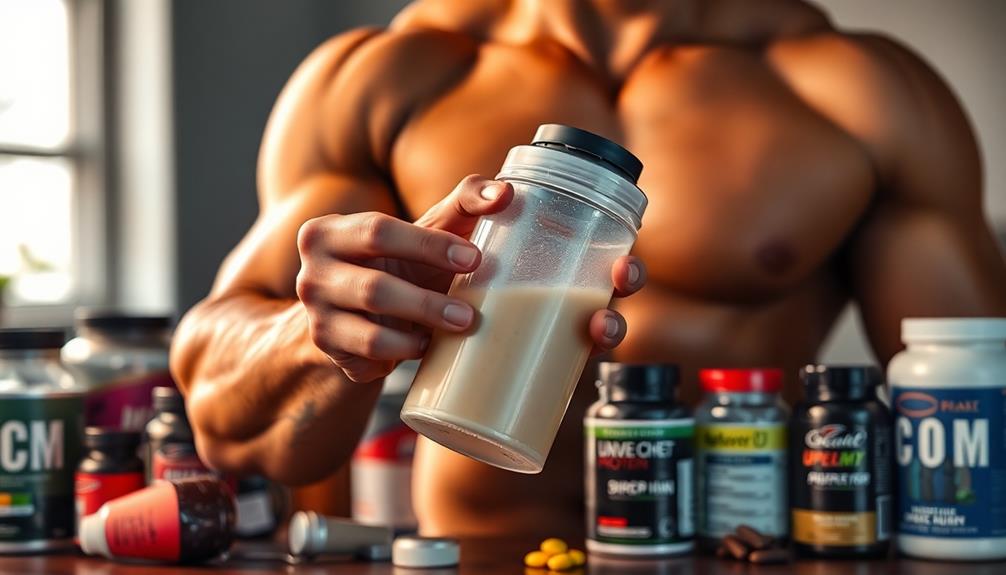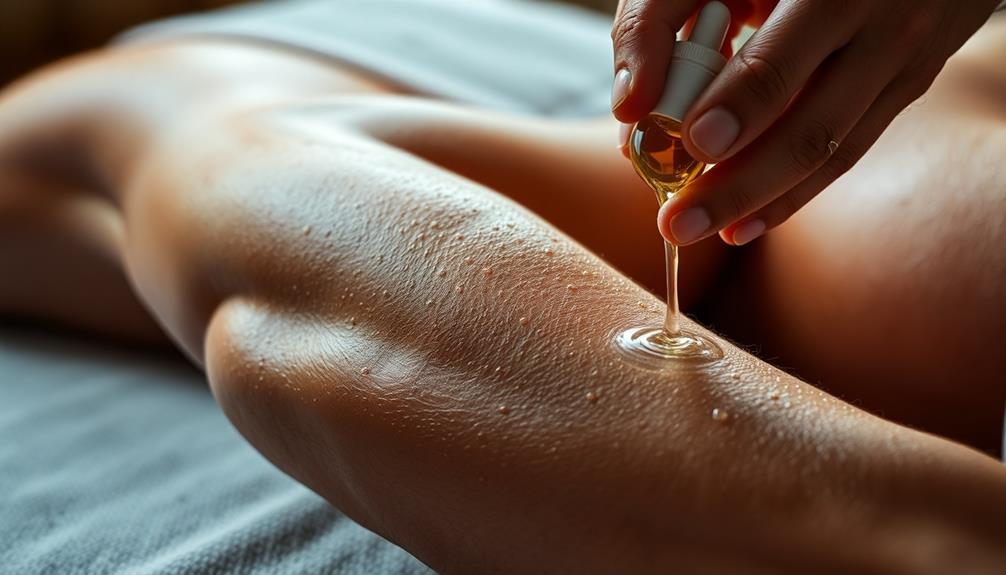To optimize muscle repair after strength training, focus on these seven essential tips: Prioritize post-workout nutrition by consuming protein and carbs within an hour. Get adequate sleep, aiming for 7-9 hours nightly to aid recovery and hormone release. Stay hydrated before, during, and after workouts. Stretch and foam roll to enhance flexibility and reduce soreness. Consider supplements wisely, such as whey protein or BCAAs, after consulting professionals. Alternate muscle groups to allow proper recovery time. Listen to your body and adjust your routine as needed. By implementing these strategies, you'll set yourself up for improved muscle repair and overall fitness progress.
Core Insight
- Consume protein and carbs within an hour after your workout to support muscle recovery and replenish energy stores.
- Get 7-9 hours of quality sleep nightly to promote muscle repair and growth hormone release.
- Stay hydrated by drinking water before, during, and after workouts to aid in muscle recovery.
- Perform stretching and foam rolling exercises to enhance flexibility and reduce muscle soreness.
- Consider using supplements like whey protein or BCAAs to support muscle repair, but consult professionals before starting.
Prioritize Post-Workout Nutrition

Eating the right foods after a strength workout is crucial for muscle recovery. Your muscles need protein and carbs to repair and rebuild. Aim to eat a meal or snack with both protein and carbs within an hour of finishing your workout. Protein bars can be a quick and easy option that provide the nutrients your muscles need.
Look for about 20-30 grams of protein in your post-workout meal. Good sources include chicken, fish, eggs, or a protein shake. Carbs are important too, as they help replace the energy stores used during exercise. Whole grains, potatoes, and fruit are all great choices.
Staying hydrated is also key for recovery. Drink water before, during, and after your workout. If you sweat a lot or had a particularly intense session, consider a sports drink with electrolytes to replace what you've lost.
Get Adequate Sleep

Sleep is key for muscle recovery. When you snooze, your body repairs itself and releases growth hormones that help your muscles bounce back. Aim to get 7-9 hours of solid sleep every night. Make your bedroom a sleep oasis – keep it cool, dark, and quiet. Stick to a regular bedtime routine to let your body know it's time to relax.
If you're having trouble getting enough Z's, try these tips:
- Skip the caffeine and screen time before bed
- Hang up some blackout curtains or grab a sleep mask
- Take a few deep breaths or meditate to unwind
Stay Hydrated

Drinking enough water is key for helping your muscles recover after exercise. Water keeps your body working right and fixes muscles. If you don't drink enough, your muscles will stay sore longer and you won't do as well in your workouts.
Tips to stay hydrated:
- Drink water before, during, and after workouts
- Check your pee – it should be light yellow
- Eat foods with lots of water like fruits and veggies
- Have drinks with electrolytes for tough workouts
- Set phone alerts to remind you to drink all day
Try to drink 8-10 cups of water every day. Drink more if you exercise a lot or live somewhere hot. Don't just drink when you're thirsty – you need to drink regularly to keep your muscles recovering their best.
Stretch and Foam Roll

Stretching and foam rolling help your body recover after strength training. When you finish your workout, spend 10-15 minutes gently stretching the muscles you used. Hold each stretch for 20-30 seconds to improve flexibility and reduce tension. A cooling towel can make stretching more comfortable, especially after intense workouts.
Foam rolling is another way to help your muscles recover. Use a foam roller to apply pressure to different parts of your body, slowly rolling over each muscle group. This breaks up knots, improves blood flow, and reduces soreness.
Begin with big muscle groups like your quads, hamstrings, and back. Then, work on smaller areas like calves and arms. Take your time, spending about 30-60 seconds on each muscle group. If you find a sore spot, pause and hold pressure there for a few moments.
Consider Supplements Wisely

When thinking about using supplements to help your muscles recover after a workout, it's important to choose carefully and know the facts. Many athletes find that combining fast-absorbing whey protein with slower-digesting casein protein gives them the best results. Some common supplements include:
- Protein powder (whey, casein, or plant-based)
- Branched-chain amino acids (BCAAs)
- Creatine monohydrate
- Omega-3 fatty acids
- Glutamine
Always do your research and talk to a doctor or registered dietitian before starting any new supplement routine.
Alternate Muscle Groups

Switching up the muscles you work is a smart way to help them recover. By focusing on different muscle groups each time you exercise, you give the ones you worked before a chance to rest and heal. If you keep using the same muscles over and over without a break, you could end up overtraining or even getting hurt. Using a foam roller can also help your muscles feel better and less sore between workouts.
To make this work, split your workouts by muscle groups. You could do chest and triceps one day, back and biceps the next, and legs on a different day. This gives each group enough time to recover and get stronger before you work them again.
You can also try dividing your workouts into upper and lower body days. This makes sure you're not overdoing it in any one area and helps you build balanced muscle all over. Just remember, getting enough rest is just as important as the exercise itself if you want to reach your fitness goals.
Listen to Your Body

As you switch between muscle groups and plan your workouts, it's just as important to listen to your body. Your body gives you helpful clues that can help you recover better and avoid getting hurt. Watch out for these signs:
- Muscle soreness that doesn't go away
- Unusual pain in your joints
- Trouble moving your body like normal
- Feeling tired or weak
- Changes in how you sleep
Taking a bath with Epsom salt can be a good way to help your muscles recover. It can reduce swelling and make sore muscles feel better. If you notice any of these signs, it's important to change your workout plan. Don't keep going if you feel pain or discomfort, as this can lead to worse injuries. Instead, think about doing less intense workouts, working out less often, or taking an extra day off. Remember, letting your body recover is a key part of building muscle. By paying attention to your body, you'll be able to train better and more regularly in the long run.
Frequently Asked Questions
How Long Does It Take for Muscles to Fully Recover After Strength Training?
You'll typically need 24-48 hours for full muscle recovery after strength training. However, it can take up to 72 hours for more intense workouts. Your recovery time depends on factors like workout intensity, nutrition, and sleep quality.
Can Massage Therapy Help With Muscle Repair and Recovery?
Yes, massage therapy can help with muscle repair and recovery. You'll experience reduced muscle tension, improved blood flow, and decreased inflammation. It can also alleviate soreness, enhance flexibility, and promote faster healing after intense workouts.
Does Age Affect Muscle Repair and Recovery Time?
Yes, age does affect muscle repair and recovery time. As you get older, you'll notice your body takes longer to bounce back after workouts. Your muscles need more time to heal and rebuild, so you'll require extended rest periods.
Are Cold Therapies Like Ice Baths Effective for Muscle Recovery?
You'll find cold therapies like ice baths can be effective for muscle recovery. They may reduce inflammation and soreness, but research is mixed. Don't rely solely on them; combine with proper nutrition, sleep, and active recovery methods.
How Do Hormones Impact Muscle Repair and Growth Post-Workout?
Your hormones play an essential role in muscle repair and growth after workouts. They regulate protein synthesis, inflammation, and nutrient uptake. Key hormones like testosterone, growth hormone, and insulin-like growth factor (IGF-1) directly influence your muscle recovery and hypertrophy.

